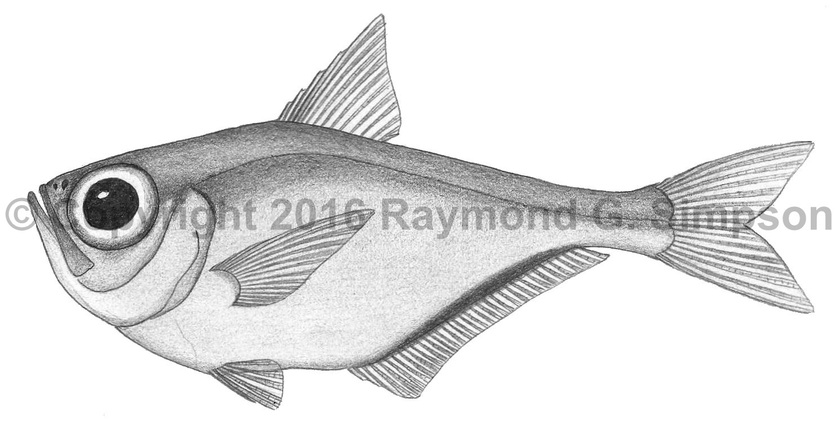
Common Name
Glassy Sweeper
Year Described
Müller & Troschel, 1848
Identification
Dorsal Fin: IV-VI (mostly V), 8-10
Anal Fin: III, 29-36
Pectoral Fin: 17-18
Pelvic Fin: I, 5
Lateral Line Scales: 50-61
Scale under lateral line: 15-17
Circumpeduncular scales: 14-17
Gill Rakers: 5-7 upper, 16-20 lower; 21-27 total
Vertebrae: 25 (10 + 15)
Body very deep and compressed. Eye very large. Mouth oblique and terminal; reaching to middle of orbit. Teeth present in both jaws, on palatine, and on vomer. Forehead relatively steep. Body profile at anal fin very steep. Caudal peduncle fairly long with a forked tail. Dorsal fin single and short-based. Pelvic fin very small. Pectoral fin with oblique base and pointed. Anal fin low and very long-based (over half of SL). Body and most of head fully scaled. Lateral line steeply sloped on the anterior end.
Color
Body silvery-red to dark copper, with bluish sheen over the flanks. Fins clear with coppery color on the anterior lobes of fins. A dark band runs along the base of the anal fin. Eye copper with a silver ring around the pupil. Juveniles silvery with coppery edging on base of fins and vertebral column and green markings on head.
Size
Maximum size to 15cm SL
Habitat
Found mostly on shallow reefs up to 30m depth. Forms large schools near recesses.
Range
S. Florida to Brazil, including the Caribbean Sea and the southeastern Gulf of Mexico. Also Bermuda.
References
McEachran, J.D. & J.D. Fechhelm. 2005. Fishes of the Gulf of Mexico. Volume 2: Scorpaeniformes to Tetraodontiformes. University of Texas Press, Austin. i-viii +1-1004.
Mooi, R. D. 2002. Pempheridae (pp. 1660-1661). In: Carpenter. 2002. The living marine resources of the Western Central Atlantic. Vol. 3: Bony fishes part 2 (Opistognathidae to Molidae). FAO Species Identification Guides for Fisheries Purposes. American Society of Ichthyologists and Herpetologists Special Publication No. 5. FAO of the U.N., Rome.